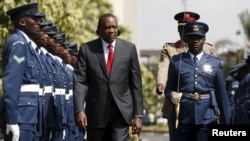Kenyan President Uhuru Kenyatta said on Thursday that ending diseases like AIDS, tuberculosis and malaria in Africa was within reach if countries spent more on healthcare which would ensure their people stayed healthy, and boost their economies.
In an exclusive blog for the Thomson Reuters Foundation, Kenyatta credited international donors for helping Africa to make "tremendous gains" in fighting these diseases, which in the 1990s killed millions of people on the continent every year.
But more investment from African governments was needed, he said.
"We are at a point where we can defeat these diseases and end them as public health threats," Kenyatta wrote. "To achieve that, we must invest more. We must commit ourselves more."
In the last decade, HIV-related deaths in Africa have halved to 790,000 in 2014, while malaria deaths fell 54 percent between 2000 and 2013, according to the World Health Organization (WHO).
But these diseases remain a threat with malaria alone killing an estimated 437,000 African children before their fifth birthday in 2013, the WHO says.
Through its partnership with the Global Fund to Fight AIDS, Tuberculosis and Malaria, which was set up in 2002 to raise money to tackle these epidemics, Kenya has been able to save 300,000 lives, Kenyatta said.
Kenya has pledged $5 million to the Global Fund for its next funding cycle, he added.
The Global Fund, a public-private partnership, is seeking $13 billion from international donors for its 2017 to 2019 funding cycle at a conference due to begin on Friday in Montreal, Canada.
If Kenya and other developing countries are to meet the U.N. Sustainable Development Goal to end these epidemics by 2030, they need to strengthen their health systems, experts say.
"We all must come together and contribute to create enough impetus against HIV, tuberculosis and malaria and other health concerns that continue to devastate our people," Kenyatta wrote.
In Kenya, 37 percent of healthcare is funded by patients, 35 percent by donors and 28 percent by the government, the government says.





